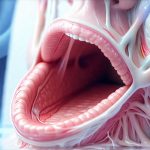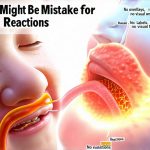Gastroesophageal reflux disease (GERD) is often associated with classic symptoms like heartburn and indigestion, but its reach extends far beyond these digestive complaints. Many individuals experience surprising manifestations of GERD that don’t immediately scream “acid reflux,” leading to misdiagnosis or delayed treatment. One such presentation involves seemingly unrelated respiratory symptoms – persistent sneezing, a nagging postnasal drip, or even chronic coughs. These symptoms can be incredibly disruptive to daily life and often lead people to believe they have allergies or a cold, when the root cause may actually lie within the digestive system. Understanding this connection is crucial for effective management and relief.
The link between GERD and these upper airway symptoms isn’t always obvious because of how the body responds to stomach acid traveling upwards. When refluxed acid reaches the esophagus, it can trigger a variety of physiological responses – not just in the throat, but also higher up into the sinuses and nasal passages. This irritation can cause inflammation and hypersensitivity, leading to increased mucus production (postnasal drip), airway constriction, and ultimately, the urge to sneeze or cough. Moreover, the vagus nerve—a cranial nerve heavily involved in both digestion and respiratory function—plays a significant role in mediating this interplay between the gut and the airways, further explaining why GERD can manifest as seemingly non-digestive symptoms.
The Connection Between Acid Reflux & Upper Airway Symptoms
The relationship between GERD and upper airway symptoms is complex and often underestimated. It’s not simply a case of acid directly irritating the nasal passages; instead, it’s a cascade of events triggered by reflux that leads to these bothersome symptoms. Laryngopharyngeal reflux (LPR) – a “silent reflux” where stomach acid reaches higher up into the throat – is particularly implicated in these presentations. Unlike typical GERD, LPR often lacks the hallmark heartburn, making it even harder to diagnose. The acidic environment irritates the delicate tissues of the larynx and pharynx, triggering inflammation and increased mucus production as the body attempts to neutralize the acid.
This chronic irritation can lead to a vicious cycle: reflux causes inflammation, inflammation increases sensitivity, and even small amounts of reflux trigger pronounced symptoms. The nasal passages are highly sensitive, so even minimal exposure to acidic fumes or inflammatory mediators can result in sneezing fits, congestion, or a constant feeling of something dripping down the back of the throat (postnasal drip). It’s important to remember that postnasal drip itself isn’t the problem; it is often a symptom of an underlying issue like reflux. The body is trying to clear out irritants – in this case, inflammation caused by acid exposure.
The anatomical proximity between the esophagus and upper airway also contributes to this connection. During sleep, for example, the lower esophageal sphincter (LES) – the muscle that prevents stomach acid from flowing back up – tends to relax, increasing the likelihood of reflux. When lying down, gravity is no longer assisting in keeping stomach contents where they belong. This nocturnal reflux can lead to significant irritation of the airways overnight, resulting in symptoms that are most pronounced upon waking. This makes identifying the source tricky as it doesn’t correlate with meal times and may appear as allergy-like symptoms.
Identifying GERD-Related Sneezing & Postnasal Drip
Distinguishing between GERD-related sneezing or postnasal drip and allergic rhinitis (hay fever) can be challenging, as both conditions share similar symptoms. However, several clues can help differentiate the two. Firstly, consider the timing of your symptoms:
– Are they worse at night or after meals? This points towards reflux.
– Do they correlate with pollen seasons? This suggests allergies.
Secondly, observe whether typical allergy medications (antihistamines) provide significant relief. If not, GERD should be investigated. A key indicator is the lack of other allergy symptoms like itchy eyes or skin rashes. Individuals with purely reflux-related postnasal drip often describe a thick, ropey mucus, while allergic postnasal drip tends to be clear and watery.
Thirdly, pay attention to any associated digestive symptoms, even mild ones. Heartburn, indigestion, bloating, or a sour taste in the mouth can all indicate GERD. However, as mentioned earlier, LPR often presents without these classic signs, making diagnosis more difficult. A healthcare professional may recommend diagnostic tests like:
1. Endoscopy: to directly visualize the esophagus and stomach for any damage from acid reflux.
2. Esophageal pH monitoring: to measure the amount of acid in the esophagus over a 24-hour period.
3. Impedance testing: assesses both acid and non-acid reflux, providing a more comprehensive picture.
Lifestyle Modifications for Managing Reflux Symptoms
Lifestyle modifications are often the first line of defense in managing GERD and associated respiratory symptoms. These changes aim to reduce acid production, prevent reflux, and minimize airway irritation. A cornerstone is dietary adjustments:
– Avoid trigger foods like caffeine, alcohol, chocolate, spicy foods, fatty meals, and citrus fruits.
– Eat smaller, more frequent meals instead of large ones.
– Avoid eating within 2-3 hours of bedtime.
Elevating the head of your bed by 6-8 inches can also help prevent nocturnal reflux. This is more effective than simply using extra pillows, as it supports the entire upper body. Weight management is crucial; excess weight puts pressure on the stomach and increases the risk of reflux. Smoking cessation is vital, as smoking weakens the LES.
Beyond diet and sleep positioning, consider these strategies:
1. Maintain a healthy weight.
2. Avoid tight-fitting clothing.
3. Manage stress levels through techniques like yoga or meditation, as stress can exacerbate GERD symptoms.
Medical Interventions & When to Seek Help
While lifestyle modifications are often effective, some individuals may require medical intervention to manage their GERD and associated respiratory symptoms. Over-the-counter medications like antacids can provide temporary relief from heartburn, but they don’t address the underlying cause of reflux. H2 blockers reduce acid production in the stomach, while proton pump inhibitors (PPIs) are more potent and block acid secretion even more effectively.
It is important to note that long-term use of PPIs should be discussed with a healthcare professional, as they can have potential side effects. If symptoms persist despite lifestyle changes and medication, or if you experience difficulty swallowing, chest pain, vomiting, or unintentional weight loss, seek medical attention promptly. A physician may recommend further investigations to rule out other conditions and tailor a treatment plan specific to your needs. This might involve stronger medications, surgical options like fundoplication (to strengthen the LES), or referral to a gastroenterologist and/or otolaryngologist (ENT specialist) for coordinated care. Addressing both the digestive and respiratory aspects of GERD is essential for achieving long-term relief and improving quality of life. You can learn more about GERD with esophagitis to understand the severity levels. If you suspect your GERD is mild, consider exploring dinner meals for GERD and IBS as a starting point for dietary adjustments. Understanding the connection between GERD and hiccups can also shed light on some unexpected symptoms. For those experiencing more subtle forms of the condition, exploring GERD without esophagitis is important. Additionally, if you experience trouble swallowing, it’s vital to understand GERD and swallowing difficulties. Finally, understanding the connection between GERD and throat clearing can help you identify the root cause of your symptoms.


















